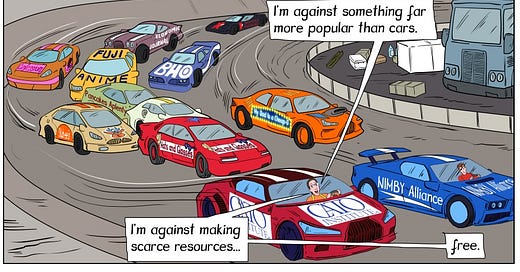While I was in Europe, I ran this guest post on cars and market urbanism by SolarxPvP. He’s on Twitter, but I’ve also met him in real life. Definitely a smart and thoughtful guy, but when he says…
The primary problem with current cities is that they are extremely car-centric. We don't realize this because it's just everyday life and we assume that cars make transportation easier and more convenient, but this is false.
…he’s almost totally wrong. Cars don’t just happen to be faster. As Glaeser and Kahn explain in the Handbook of Regional and Urban Economics and their “Why Do the Poor Live in Cities?” (Journal of Urban Economics, 2008), cars have a strong inherent speed advantage.
Why? Because of fixed time costs. When you use public transportation, you have to (a) walk to the pickup point, (b) wait, (c) travel, then (d) walk to your final destination. When you drive, (a) you get in your car and go straight to your final destination. There is no (b). Glaeser and Kahn elaborate:
We found that public transportation appears to involve a fixed time cost of approximately 16–20 minutes, regardless of length. After this fixed time costs, cars appear to be about 50 percent faster than buses and roughly as fast as trains. It is this fixed time cost that makes public transportation so costly. The time spent walking (or driving) to the station or bus stop plus the time spent waiting for the bus or train plus the time spent walking or driving to the final destination appears to take up as much time as driving ten miles. As time has gotten more valuable, the time costs of public transportation have become more severe and the population has continued to move entirely towards the automobile.
If you have any doubts, go to Google Maps and compare the travel time for any route that pops into your mind. At the moment, a journey from my office to the White House takes 34 minutes by car but a full 1 hour, 43 minutes by mass transit. Look closely: It’s almost faster to bike the full 18 miles!
Think I’m cherry-picking (or “lemon-picking”)? Go to Google Maps, type in any route you can think of, and see what happens. I say cars win at least 90% of the time.
Is the problem that I’m focusing on the U.S., notorious for its awful mass transit? I’ve also spent ample time weighing ground transportation options on my many foreign travels. Even in Germany, home of one of the world’s most storied rail systems, cars almost always beat trains.* Bullet trains are the only clear counter-example. Those I’ve taken in Spain and Japan are much faster than cars, but only for a short list of prestige destinations.
What about using trains to beat traffic jams and avoid parking problems? Yes, this often works in the most congested cities during the most congested times. But even in such scenarios, the only reason trains outshine cars is that governments stubbornly refuse to implement peakload pricing for roads and parking. Give us well-functioning electronic pricing - and the best argument against cars goes down the drain.
From a natalist point of view, moreover, cars plainly rule. I quite enjoy a nice bike ride in the German countryside. Still, to use bikes to transport young kids, groceries, and other purchases is awful. And in bad weather, worse than awful. I vividly remember my first day in Denmark, where I watched the “happiest people in the world” grimly bike in the rain as I drove past them in my taxi.
The same goes for trains, busses, and other car-substitutes. Under rarefied conditions, they make parents’ lives easier. Once your kids reach their tweens or teens, you don’t have to chauffer them anymore. Yet for families with younger kids to move around using only mass transit is a giant pain.
SolarxPvP is right, of course, that the dominance of cars is partly a government decision. Yet the main reason why cars dominate remains the primordial fact that - with rare exceptions - they’re the most convenient way to travel. Some governments desperately fight this reality. Most reluctantly accept it. A wise government would embrace it.
* Doesn’t Germany also have autobahns without speed limits? Sure, but so could every country. Imagine the convenience of peakload pricing on highways where you can drive as fast as you please.
Subscribe to Bet On It
Caplan and Candor


















Hmmm... sounds like this was written by somebody who's never tried to find parking in a big city. Sure, I can get from Westchester County to Manhattan a lot faster in a car than on the commuter rail most of the time (forget that at rush hour, though), but the extra time of parking pretty much reduces that gain to near zero or less.
But maybe we're talking about longer trips, say between cities. I travel between Boston and NYC very often. Depending on circumstances I take the train or drive. On good days, driving is faster, but on all days, it's much more stressful. On bad days, driving can be a nightmare of sitting in traffic jams at odd parts of the trip, usually due to road construction or an accident, but often because of just too much traffic. The train is reliable and easy. I almost always bring my computer and get some work done, but around me people are reading, watching movies, eating a meal, having a drink. Unless I've got a particular reason to drive like carrying a bunch of stuff, or needing to go to some out of the way place, I'll take the train any day.
Yes, I know this is cherry picking places where train service is good and the roads suck, but my argument is that if the train service were better in many other places it wouldn't be a bad thing.
"Once your kids reach their tweens or teens, you don’t have to chauffer them anymore."
My kid is 4 and I don't have to chauffeur her anywhere because the streets are free from cars and everything she needs is reachable on foot or her scooter.
I will stop commenting now.